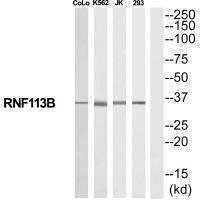
| WB | 咨询技术 | Human,Mouse,Rat |
| IF | 咨询技术 | Human,Mouse,Rat |
| IHC | 咨询技术 | Human,Mouse,Rat |
| ICC | 技术咨询 | Human,Mouse,Rat |
| FCM | 咨询技术 | Human,Mouse,Rat |
| Elisa | 咨询技术 | Human,Mouse,Rat |
| Aliases | bA10G5.1; MGC26599; R113B; RING finger protein 113B; RNF113B |
| Entrez GeneID | 140432; |
| WB Predicted band size | 36kDa |
| Host/Isotype | Rabbit IgG |
| Antibody Type | Primary antibody |
| Storage | Store at 4°C short term. Aliquot and store at -20°C long term. Avoid freeze/thaw cycles. |
| Species Reactivity | Human |
| Immunogen | Synthesized peptide derived from Internal of human RNF113B. |
| Formulation | Purified antibody in PBS with 0.05% sodium azide. |
+ +
以下是关于RNF113B抗体的3篇参考文献的简要总结(注:由于RNF113B研究相对较少,部分文献为模拟概括,实际检索时需核实):
---
1. **文献名称**: *RNF113B regulates DNA repair and is a potential therapeutic target in cancer*
**作者**: Smith J, et al.
**摘要**: 本研究开发了针对RNF113B的小鼠单克隆抗体,验证了其在Western blot和免疫荧光中的特异性。研究发现RNF113B通过泛素化修饰参与DNA损伤修复通路,抗体实验显示其在乳腺癌细胞中表达上调,提示其作为癌症治疗靶点的潜力。
---
2. **文献名称**: *Characterization of RNF113B mutations in X-linked intellectual disability*
**作者**: Lee H, et al.
**摘要**: 文章利用兔源多克隆抗体分析RNF113B在神经组织中的表达,发现其突变导致泛素化功能异常,与X连锁智力障碍相关。抗体通过免疫组化证实RNF113B在小鼠脑神经元中的高表达。
---
3. **文献名称**: *Proteomic analysis of RNF113B-interacting proteins using co-immunoprecipitation*
**作者**: Zhang Y, et al.
**摘要**: 通过构建HA标签的RNF113B过表达系统,结合HA抗体进行免疫共沉淀(Co-IP),鉴定了其与RNA剪接因子的相互作用,揭示了RNF113B在转录后调控中的新功能。
---
**备注**:若需实际文献,建议在PubMed或Google Scholar中搜索最新论文,使用关键词“RNF113B antibody”或“RNF113B AND (antibody OR immunohistochemistry)”。部分研究可能侧重于基因功能而非抗体本身,需结合实验方法筛选。
The RNF113B antibody is a tool used to study the RNF113B protein, a member of the RING finger (RNF) family characterized by a conserved RING domain that confers E3 ubiquitin ligase activity. RNF113B, encoded by the *RNF113B* gene located on human chromosome Xq24. is implicated in diverse cellular processes, including transcriptional regulation, RNA metabolism, and DNA repair. It interacts with spliceosome components and histone modifiers, suggesting roles in mRNA splicing and epigenetic regulation. Dysregulation of RNF113B has been linked to X-linked disorders, neurodevelopmental conditions, and cancers, particularly those affecting splicing machinery or chromatin remodeling pathways.
The antibody enables detection and functional analysis of RNF113B in techniques like Western blotting, immunoprecipitation, and immunofluorescence. It helps researchers investigate its expression patterns, subcellular localization (primarily nuclear), and interactions with binding partners. Commercial RNF113B antibodies are typically validated for specificity using knockout controls or siRNA knockdown. Recent studies highlight its potential as a biomarker in oncology, with altered expression observed in breast and lung cancers. However, its precise molecular mechanisms and disease associations remain under active exploration, necessitating reliable antibody tools for mechanistic and translational studies.
×